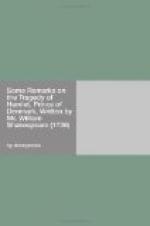Before I conclude, I must point out another Beauty in the Tragedy of Hamlet, besides those already mentioned, which does indeed arise from our Author’s conforming to a Rule which he followed, (probably, without knowing it,) only because it is agreeable to Nature; and this is, that there is not one Scene in this Play but what some way or other conduces towards the Denoueement of the Whole; and thus the Unity of Action is indisputably kept up by every Thing tending to what we may call the main Design, and it all hangs by Consequence so close together, that no Scene can be omitted, without Prejudice to the Whole. Even Laertes going to France, and Ophelia’s Madness, however trivial they may seem (and how much soever I dislike the Method of that last mentioned) are Incidents absolutely necessary towards the concluding of all; as will appear to any one upon due Consideration. This all holds good, notwithstanding it is my Opinion, that several of the Scenes might have been altered by our Author for the better; but as they all stand, it is, as I said, quite impossible to separate them, without a visible Prejudice to the Whole. I must add, that I am much in Doubt, whether Scenes of Prose are allowable, according to Nature and Reason, in Tragedies which are composed chiefly of Blank Verse; the Objection to them seems to be this, that as all Verse is not really in Nature, but yet Blank Verse is necessary in Tragedies, to ennoble the Diction, and by Custom is become natural to us, Prose mixed with it serves only, methinks, to discover the Effects of Art, by the Contraste between Verse and Prose. Add to all this, That it is not suitable to the Dignity of such Performances.
In short, Vice is punished in this excellent Piece, and thereby the Moral Use of it is unquestionable. And if Hamlet’s Virtue is not rewarded as we could wish, Mr. Addison’s Maxim ought to satify us, which is this, “That no Man is so thoroughly Virtuous as to claim a Reward in Tragedy, or to have Reason to repine at the Dispensations of Providence; and it is besides more Instructive to the Audience, because it abates the Insolence of Human Nature, and teaches us not to judge of Men’s Merit by their Successes. And he proceeds farther, and says, that though a virtuous Man may prove unfortunate, yet a vicious Man cannot be happy in a well wrought Tragedy.” This last Rule is well observed here.




